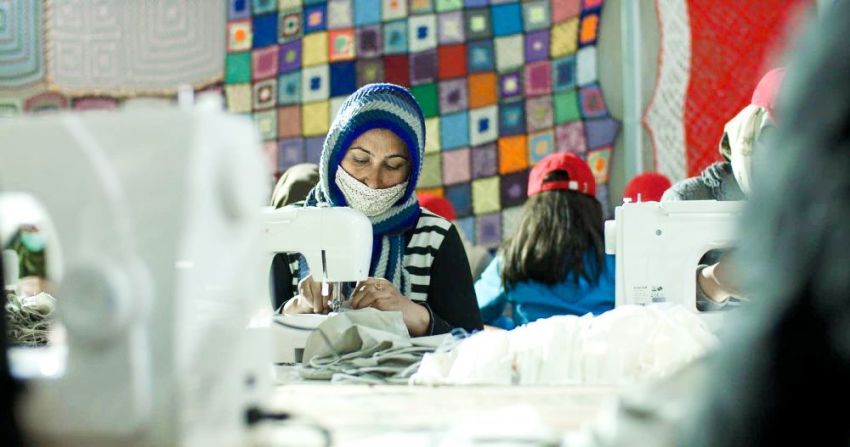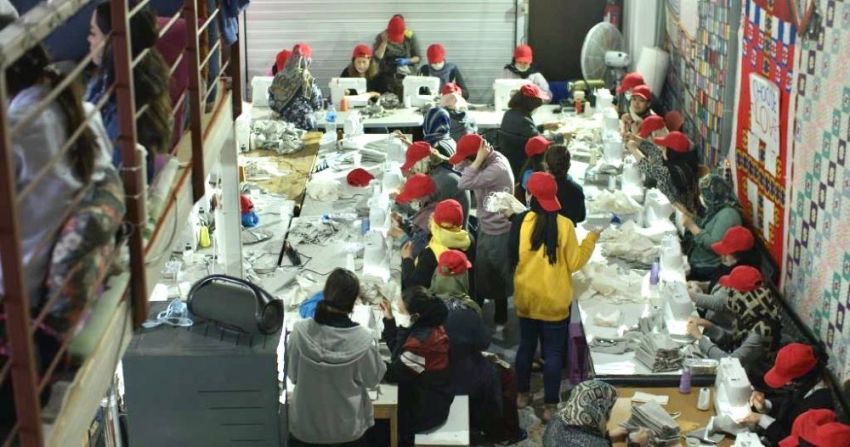Refugees make face masks to help American evangelical churches fight coronavirus

Refugees in the largest refugee camp in Europe have made thousands of cotton face masks, some of which are being distributed at evangelical churches in the United States, as a way to give back to people in the West and help them battle the coronavirus.
Refugees fleeing violence and persecution from across the Middle East and Northern Africa, who are now sheltered in the Moria refugee camp on the Greek island of Lesbos, have been busy in recent months making face masks during the coronavirus pandemic as part of an effort funded by two international nongovernmental organizations.
The efforts initially began as a way to create face masks for the refugees themselves and mitigate the spread of COVID-19 in the extremely overcrowded camp that shelters over 15,000 people despite having an official capacity of about 2,000 people. Many people living at the camp are waiting for their asylum claims to process and are living in horrendous conditions.
“The refugees began making masks for themselves to try to help with the mitigation efforts. Once they finished, they asked to continue making the masks and send them elsewhere to help,” Pastor Robbie McAlister, who works with the National Immigration Forum and the Evangelical Immigration Table, told The Christian Post. “This is giving them an opportunity to have a purpose.”
McAlister said that these are “refugees who have nothing” that “are giving back to people that have come and serve them with whatever they can.”
“It’s just a beautiful story of what I would call reciprocal love and care for one another.”
The mask-making effort is sponsored by the nonprofit organizations When We Band Together and Team Humanity, both of which have provided the infrastructure and materials needed to make tens of thousands of masks. From McAlister’s understanding, there are between 150 to 200 refugee volunteers that have produced masks.
According to WWBT, the volunteers are working with Team Humanity, which established a mask-making center next to the refugee camp.
So far, the masks, which are 100% cotton, double-layered and washable, have been sent throughout Europe and the U.S.
McAlister, a consultant who has encouraged churches throughout South Carolina to serve in Moria, received about 2,000 of the face masks. So far, he has distributed them to seven churches in South Carolina, most of which have sent teams to Moria in the past.
About 300 volunteers from churches across South Carolina have visited the camp in the last 3 1/2 years.
The pastor also gave 750 face masks to Columbia International University, a private Christian school that has also sent volunteers to Moria.
“A lot of churches are making them available to their members and tell them the story that these are made by refugees who are trying to give back to those of us who have gone and tried to help them,” he said.
“A lot of the pastors have used [the face masks] to share a positive message about refugees to their congregations. It is just a great opportunity for us to just show that we are all part of humanity and we need to care for one another and God loves the whole world. He certainly has a special place in His heart for the orphan or the widow or the vulnerable and those that are sojourning.”
McAlister said that his church, Riverbend Church in Lexington, has encouraged members to take the face masks and pray for the refugees every time they use the masks.
“It is a way for us to give even from here without actually being in the camp,” he said.

Jimmy Parris, the senior pastor of River Springs Church in Irmo, told CP that he led a team of six members from his church to visit the camp in February, right before the coronavirus lockdowns began to take place. He said that his church has received about 100 of the face masks.
The masks have been made available for people at River Springs Church, which recently resumed its in-person services.
“We also have a community blessing box outside of the church that we usually fill with groceries and nonperishables, diapers and things like that,” Parris said. “We have been able to stock that with masks as well for people in the community who might need them and not have access to them.”
“A lot of folks are very shocked by the fact that they are doing this for us. [But the refugees] feel it is so important to give back.”
McAlister noted that many of the refugees in the camps are well educated and looking for a way to maintain their sense of self-worth.
“[Some] were working jobs as professors and businessmen or whatever. A lot of them are multilingual and they find themselves in these camps with no outlet for their creativity and their work opportunity,” he said. “Providing these kinds of outlets gives them a sense of wellbeing and self-worth as well. They are not happy being there and not able to contribute.”
Follow Samuel Smith on Twitter: @IamSamSmith
or Facebook: SamuelSmithCP



























